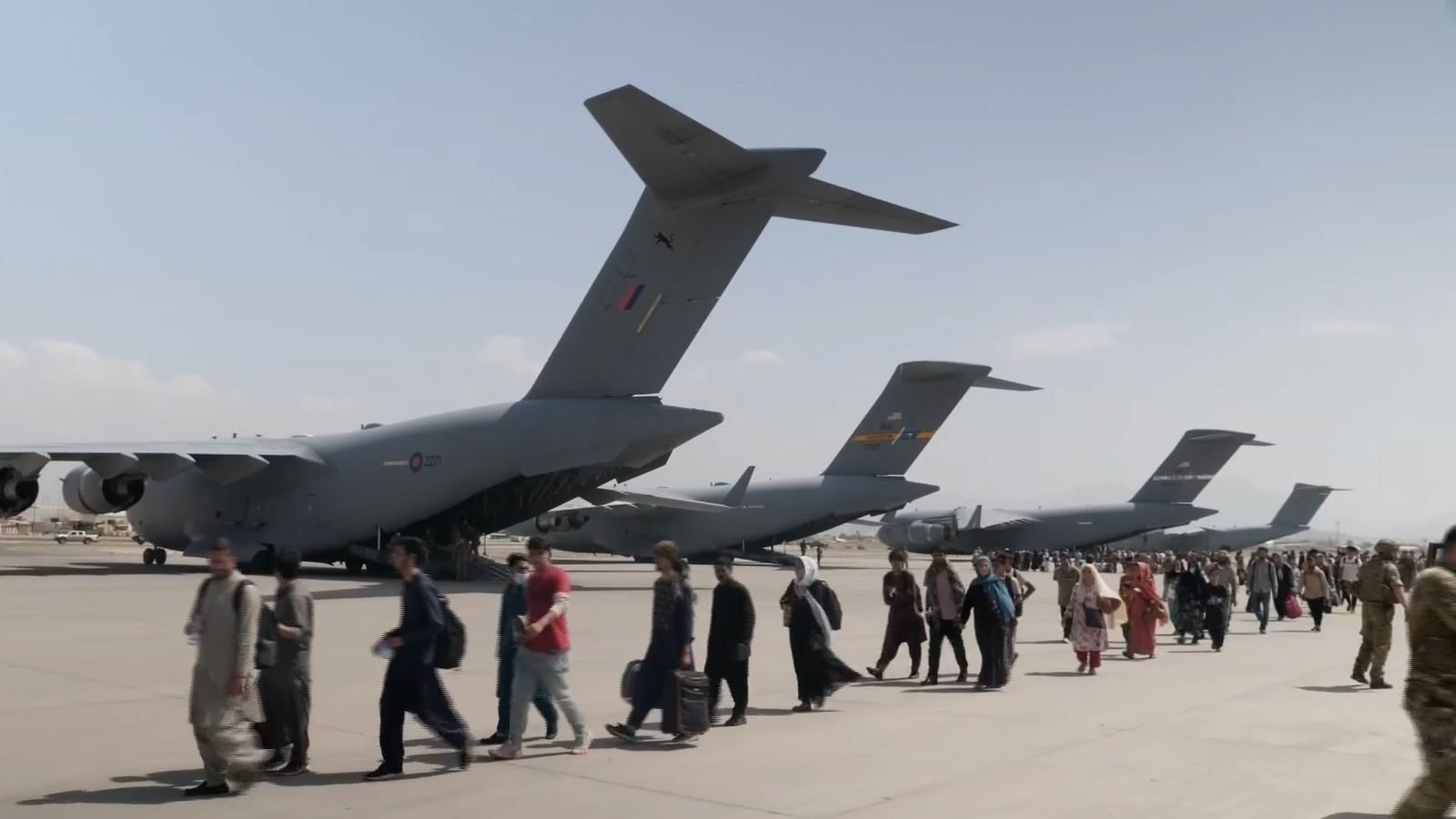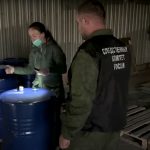A former government employee has claimed the UK effort to evacuate people from Afghanistan was chaotic and understaffed.
Raphael Marshall worked as a desk officer at the Foreign, Commonwealth and Development Office (FCDO) from November 2018 to September 2021.
He resigned following a week-long stint on the Afghan Special Cases team, which worked to evacuate eligible Afghans and bring them to the UK after the Taliban reclaimed Kabul in August.
In evidence to the Commons foreign affairs select committee he claims emails from desperate Afghans went unread, junior officials with no local knowledge worked on specialist cases, and the prime minister pushed for animals to be rescued at the “direct expense” of humans.
The foreign secretary at the time, Dominic Raab, has denied the allegations and said the government did “everything we could” to rescue the vulnerable after the Taliban takeover.
Here Sky News looks at eight key accusations made in Mr Marshall’s 40-page testimony.
Fewer than 5% received helped
In his evidence, Raphael Marshall claimed that “between 75,000 and 150,000 people”, including their dependents, applied to be evacuated from Afghanistan after the Taliban claimed victory on 15 August.
He said that for a number of reasons “fewer than 5% of these people received any assistance”.
Afghans who had served alongside British troops or diplomatic staff were all eligible for evacuation.
Local soldiers, politicians, journalists, civil servants, activists, aid workers and judges who worked for the former Afghan government could also apply as their links to UK forces made them potential targets for the Taliban.
Mr Marshall said that of the 95% of applicants left behind “it is clear that some have since been murdered by the Taliban”.
Dogs evacuated at ‘direct expense’ of humans
As Afghans tried to flee the new Taliban regime, a former Royal Marine called for the government to help evacuate vulnerable animals too.
Paul “Pen” Farthing founded an animal shelter called Nowzad in Afghanistan after serving there in 2006.
Following the Taliban takeover, he chartered his own private plane to bring all his animals, staff and their families to the UK, but was only able to bring back 170 cats and dogs – and no people.
According to Mr Marshall, the Foreign Office “received an instruction from the prime minister” to use “considerable capacity” to help Mr Farthing’s animals leave Afghanistan.
He says this request came at the expense of vulnerable Afghans.
“There was a direct trade-off between transporting Nowzad’s animals and evacuating British nationals and Afghans evacuees, including Afghans who had served with British soldiers,” he said.
He added that the fact Mr Farthing was able to use a private plane was irrelevant, as British soldiers were still required to escort the animals at the airport – where there was limited capacity.
Staff’s work-life balance took priority
Despite the urgency of the situation on the ground, Mr Marshall said there was no expectation that Foreign Office staff should work overtime back in the UK.
He said there was a “deliberate drive by the FCDO to prioritise ‘work-life balance'”.
This resulted in “serious shortages of capacity” and the approach “undermined organisational effectiveness”, he added.
Mr Marshall also claimed that at one point, during the height of the evacuation effort, he was “the only person monitoring and processing emails in the Afghan Special Cases inbox”.
Criteria for evacuation done ‘badly’
Mr Marshall described the process for deciding which Afghans were eligible for evacuation as “unhelpful”, as it did not set out which criteria had to be met.
This left it up to the discretion of individual employees.
“These decisions were made badly,” he said.
There was also a lack of evidence to support applicants’ claims that they were in danger, he said, which could have meant that “some evacuation spots were misallocated to people”.
Mr Marshall claimed Mr Raab, as foreign secretary, approved a list of priority professions, including judges and intelligence officers, but this was not given to the people reading the emails.
He said that locals who worked as guards protecting the British embassy did not get any priority.
Staff had ‘no knowledge’ of Afghanistan
The team handling Afghan special cases had a woeful lack of knowledge about the country, according to Mr Marshall.
His evidence claims that no members of the special cases team had worked on Afghanistan previously or studied it in any form.
He said that as many senior staff were on their summer holidays, junior officials were “being asked to make hundreds of life and death decisions about which they knew nothing”.
On two morning shifts, the “team leader… did not know that the correct term for people from Afghanistan was Afghans and referred repeatedly to Afghanis”.
He said that until 24 August – a week before the evacuation deadline – phone calls were made only in English.
And the Dari emails written by the FCDO inviting Afghans for evacuation were incorrect, because they stated a printed version was required at Kabul Airport, when a digital one would have been accepted.
Referring to Mr Raab in particular, he said that he needed “several hours” to “engage with notes” about people who urgently needed to be evacuated.
According to Mr Marshall, the then-secretary of state required “all the cases set out in a well-presented table to make decisions”.
Desperate people’s emails went unread
Mr Marshall accuses the government of falsely claiming all applications for evacuation were read.
He said that at “any given moment” between 21 August and 25 August – at the height of the evacuation effort – “there were usually over 5,000 unread emails… many dating from early August”.
“These emails were desperate and urgent,” Mr Marshall said. “I was struck by many titles including phrases such as ‘please save my children’.
After The Observer reported the 5,000 unread emails, a new system was brought in, according to his evidence.
But he said this would mean that emails were skim-read and marked with a red flag, but people’s details were not entered into the system.
Mr Marshall claimed that this was “to allow the prime minister and the then-foreign secretary to inform MPs that there were no unread emails”.
“We never returned to these emails due to a lack of time,” Mr Marshall said. “They were therefore de facto eliminated from the evacuation process.”
The inbox was also locked at one point, according to Mr Marshall, which he says suggests the process only had a “public relations purpose”.
Poor integration with other government departments
The British evacuation effort in Afghanistan involved several other government departments.
Once the list of eligible Afghans was finalised by the FCDO, their details were sent to the Home Office for security checks.
But anyone who had missed out any details, such as passport number or date of birth, was rejected and not followed up, according to Mr Marshall.
A preliminary list of “very high priority cases” was sent to the Home Office before the finalised one, but Mr Marshall claims that when he checked on it 24 hours later it had been “lost somewhere”.
The next day a list of 1,000 eligible applicants was sent at once, but it took six hours for any confirmation of who had passed security checks, Mr Marshall said.
Both staff from the Ministry of Defence (MoD) and the former Department for International Development (DFID) were asked to fill in shifts during the crisis.
But neither were allowed access to IT systems, so “had to be escorted” to “guard against potential espionage”.
Army back-up staff had no computers
When members of the army were called upon to help the special cases team, they were unable to use the laptops they were given as the FCDO IT department had not unlocked them, Mr Marshall said.
This resulted in one computer being shared between eight people, he added, with many untrained on the software being used.
Mr Marshall said that this could have “directly resulted in the deaths of unnecessary people being left behind”.
Government response
In response to Mr Marshall’s claims, a government spokesperson defended its record on the evacuation.
“UK government staff worked tirelessly to evacuate more than 15,000 people from Afghanistan within a fortnight,” they said.
“This was the biggest mission of its kind in generations and the second largest evacuation carried out by any country. We are still working to help others leave.
“More than 1,000 FCDO staff worked to help British nationals and eligible Afghans leave during Op Pitting. The scale of the evacuation and the challenging circumstances meant decisions on prioritisation had to be made quickly to ensure we could help as many people as possible.
“Regrettably we were not able to evacuate all those we wanted to, but our commitment to them is enduring, and since the end of the operation we have helped more than 3,000 individuals leave Afghanistan.”






















